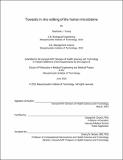Towards in vivo editing of the human microbiome
Author(s)
Yaung, Stephanie J. (Stephanie Jinyu)
DownloadFull printable version (7.907Mb)
Other Contributors
Harvard--MIT Program in Health Sciences and Technology.
Advisor
George M. Church.
Terms of use
Metadata
Show full item recordAbstract
The human microbiota consists of 100 trillion microbial cells that naturally inhabit the body and harbors a rich reservoir of genetic elements collectively called the microbiome. Efforts based on metagenomic sequencing of microbiomes associated with healthy and diseased individuals have revealed vast effects of microbiota on human health. However, compared to the expanding amount of sequence data, little is known about the function of these microbes and their genes. Furthermore, current clinical approaches to modify the microbiota face several challenges, including colonization resistance in competitive environments such as the gut, and imprecise ecological perturbations using antibiotics and fecal transplants. The fundamental objective of this research is to develop safe methods to genetically edit the microbiome in vivo to promote human health. The abilities to introduce commensally fit strains and to control specificity of microbial modulations are critical steps towards ecological engineering of healthy microbiota. This thesis describes strategies to investigate, propagate, and ultimately engineer desired functions in microbiota. In particular, we developed a temporal functional metagenomics method to identify genes that improved microbial fitness in the mammalian gut in vivo. We also built foundational tools for delivering genetic elements and immunizing endogenous microbiota against acquiring antibiotic resistance and toxins. In addition to leveraging bacterial conjugation and the prokaryotic defense system CRISPR-Cas9, we employed bacteriophages for depleting native strains to empty the niche for an engineered version. Our work enables applications in engineering probiotic strains with augmented fitness and anti-pathogenesis properties, tempering host autoimmunity, and combating hospital-acquired infections and enteric diseases.
Description
Thesis: Ph. D., Harvard-MIT Program in Health Sciences and Technology, 2015. This electronic version was submitted by the student author. The certified thesis is available in the Institute Archives and Special Collections. Cataloged from student-submitted PDF version of thesis. Includes bibliographical references (pages 174-199).
Date issued
2015Department
Harvard University--MIT Division of Health Sciences and TechnologyPublisher
Massachusetts Institute of Technology
Keywords
Harvard--MIT Program in Health Sciences and Technology.